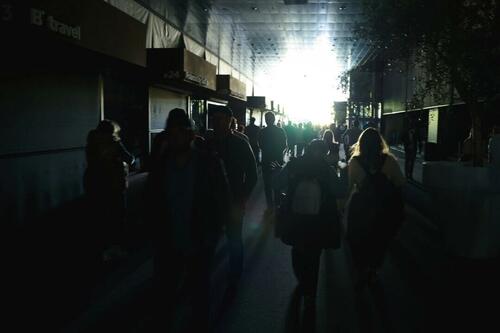Authored by Jonathan Miltimore via the Washington Examiner,
A massive blackout crippled Spain and Portugal on Monday, April 28, grounding flights, halting transport, and leaving millions without power.
The cause was “unclear,” the New York Times reported, with “no evidence of a cyberattack.”
As Spanish officials urged citizens to stay off the roads, European leaders said they were attempting to ascertain the cause of the mysterious outage.
“We do not yet have conclusive information on the reasons for this [power] cut,” Spain’s Prime Minister, Pedro Sanchez, said in a national address.
On Tuesday, April 29, power was largely restored, but the Associated Press reported that the blackouts “remain a mystery.”
Some pundits, however, observed a remarkable coincidence in the timing of the blackouts.
“Six days ago, the media celebrated a significant milestone,” Michael Shellenberger observed on Substack.
“Spain’s national grid operated entirely on renewable energy for the first time during a weekday.”
Shellenberger was not the only person to claim that Europe’s overreliance on intermittent sources such as wind and solar had left its energy grid vulnerable.
“I would say there’s a strong chance that the large amount of solar on the system created the conditions for this to be a widespread blackout and made it much worse,” said Kathryn Porter, an independent energy consultant.
Many saw this tragedy coming.
European lawmakers’ infatuation with “green” energy, which is not as green as its supporters would have you believe, has been causing problems on the continent. Energy prices have soared in recent years. As the average household electricity bill skyrocketed, many nations scrapped energy taxes to help struggling (and angry) consumers.
In their rush to go green, many countries (including Spain) over the last decade began to phase out not only fossil fuels but nuclear power.
A tightening energy supply was exacerbated by the outbreak of the Ukraine War. Facing a full-blown energy crisis, governments began imposing regulations that forced Europeans into more Spartan lifestyles.
Energy rationing, including limits on hot showers and swimming pools, fueled public anger and helped trigger the 2024 “greenlash,” as Green parties were routed across Europe.
Spain and Portugal were among the nations that resorted to energy rationing. A European Union agreement tailored specifically for these nations was approved by lawmakers despite opposition from some regional authorities.
The law, among other things, set temperature limits for public and commercial buildings (no lower than 80°F for cooling, no higher than 66°F for heating), required “energy-efficient” appliances, and accelerated renewable energy projects. Meanwhile, the law was accompanied by a plan to cut 13.5 percent of domestic gas for power generation.
These actions didn’t happen in a vacuum. It was all part of Spain’s plan to achieve net-zero emissions by 2050.
Net zero was always a pipe dream, but it was a lucrative one for politicians and their allies. Under the banner of fighting climate change, lawmakers funneled billions of dollars into subsidies, grants, and contracts that enriched a network of special interests, including renewable energy companies, consulting firms, and financial institutions.
The climate ring is now collapsing, but the costs of the experiment are visible. Europe’s energy infrastructure has languished and is in dire need of investment. Meanwhile, historically low fossil fuel prices have concealed the energy crisis Europe still faces.
European leaders promise a full investigation into the outage, but they’ll be reluctant to admit their own policies are to blame for the energy disaster.
While pundits were already quipping about net zero—“No iPhone charge, no Netflix, no Uber Eats, No Nothin’!”—energy policy is no laughing matter. Blackouts kill people.
Those on life support are sustained by equipment that runs on electricity. In the absence of generators, dialysis patients go without treatment when machines lose power. Home oxygen concentrators shut off, leaving respiratory sufferers gasping for oxygen. Traffic signals fail, causing fatal collisions. Water pumps stop. Refrigerators go dark, spoiling food supplies and triggering foodborne illnesses.
Americans should be paying close attention to developments in Europe.
The government-manufactured incentive structure that encouraged European lawmakers to abandon more reliable forms of energy and replace them with expensive intermittent energy sources also exists in the United States, where lawmakers dream of a “Green New Deal” and a world without fossil fuels.
None of this is to say there’s no room for renewable energies in the global future. There is. Battery technology is rapidly improving. And solar energy at utility scale has shown great potential.
But the effort to purge fossil fuels from economies and reshape the global economy through heavy-handed regulations, wealth transfers, and centralized planning was always tinged with economic hubris, if not madness.
“The curious task of economics,” the Nobel Prize-winning economist F.A. Hayek observed, “is to demonstrate to men how little they really know about what they imagine they can design.”
Europeans receiving such a lesson now find themselves powerless.
Loading...
